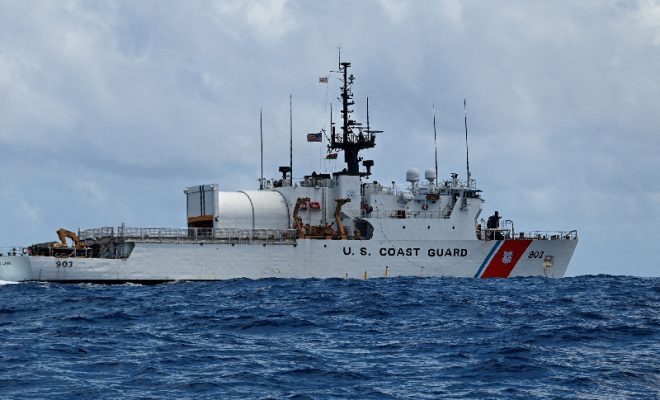U.S. Coast Guard’s Boardings of Chinese Fishing Vessels

The U.S. Coast Guard’s recent boardings of Chinese fishing boats in the Pacific Islands, in collaboration with local police, have sparked a diplomatic dispute with China. The joint patrols, aimed at protecting coastal fisheries, have been conducted at the request of Pacific nations. However, China’s Ambassador to New Zealand has called these actions illegal, stating that ship rider agreements between the U.S. and Pacific nations do not bind China’s fishing fleet.
The Dispute Unfolds: U.S. Coast Guard’s Boardings
China’s Ambassador Wang Xiaolong’s assertion that the U.S. Coast Guard’s activities violate international law has been refuted by U.S. Coast Guard Rear Admiral Michael Day. He emphasized that the boardings are conducted in compliance with international law and at the request of host nations to protect their Exclusive Economic Zones (EEZs). Commander Nicole Tesoniero highlighted the success of ship rider agreements with several Pacific nations, resulting in numerous boardings and violations found.
The Maritime Militia Allegation:
Admiral John Aquilino, Commander of the U.S. Indo-Pacific Command, has likened China’s fishing fleet in the South Pacific to a “maritime militia,” citing its activities in the South China Sea and East China Sea. Aquilino warned that these vessels could potentially be used to pressure host nations in times of crisis, such as at Scarborough Shoal or the Senkaku Islands.
China’s Response and Supervision of Fishing Fleets:
In response, Ambassador Wang emphasized China’s strict supervision of its distant water fishing fleets, its zero-tolerance policy towards illegal fishing, and its respect for the sovereign rights of coastal states. However, the U.S. Coast Guard’s actions come after previous incidents where Pacific Island nations with close ties to China denied a U.S. Coast Guard vessel entry for refuelling, highlighting tensions in the region.
Also Read | Philippines Seeks Diplomatic Solutions with China to Ease South China Sea Tensions
International Cooperation Against Illegal Fishing:
The U.S. is not alone in its efforts to combat illegal fishing in the region. Australia, New Zealand, and Britain have also increased navy patrols in partnership with Pacific Island nations to monitor coastal waters and EEZs. This collaborative approach aims to protect the rich marine resources of the South Pacific from illegal exploitation.
The U.S. Coast Guard’s boardings of Chinese fishing vessels in the South Pacific, undertaken at the request of Pacific nations, have raised tensions with China. While China asserts its rights over its fishing fleet, the international community, including the U.S. and its allies, remains committed to protecting the marine environment and ensuring compliance with international law in the region.



